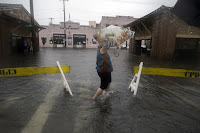For years, however, there has been a discrepancy between two different ways of doing sea level rise projections. Research using the so-called semi-empirical model exploiting statistical relationships between sea level and climate forces didn’t match those using the process-based models that employ complex physics of separate elements. This meant that the scientific community — along with the IPCC — has been wary on the level of certainty reached in some of the projections.
That’s not to say the scientific community was unsure sea level rise is happening, and that greenhouse gases are behind it. It means that the certainty surrounding sea level rise projections needed to improve, according to the IPCC. Now, however, two separate studies developed by the Potsdam Institute for Climate Impact Research in Germany, and Rutgers University in the United States, say modeling techniques are agreeing like never before in their conclusions.
Most importantly, while the Potsdam study found that sea level rise will likely be as much as 50 inches by the end of the century unless greenhouse gas emissions are rapidly reduced, the Rutgers study found that global sea levels rose faster in the last century than in the last 3,000 years. Both studies were published Monday in the Proceedings of the National Academy of Sciences.
Researchers reached by ThinkProgress said that together, these studies are important tools for policymakers and stress the high stakes of inaction. They also show how much models have evolved and that certainty behind sea level rise projections is equally growing. “One important thing that this paper shows us is a maturation of the modeling techniques being used,” said Andrea Dutton, assistant professor of geology at the University of Florida, while referring to the Rutgers study. In an email to ThinkProgress, Dutton also noted the study gives robust confidence on future sea level projections.
Anders Levermann, a co-chair for adaptation at the Potsdam Institute for Climate Impact Research, said the study he coauthored finds with a 90 percentile confidence level that future sea level rise will be between 20 to about 50 inches. This high level of confidence come as scientists have made significant progress in modeling how mountain glaciers and ice sheet loss affect the environment, he said.
...
The Rutgers study, meanwhile, puts the role of humans in sea level rise within an unprecedented historical context, researchers said. “Scientists are never 100 percent sure but we are very sure about this,” said Benjamin Horton, a researcher of marine sciences at Rutgers University. “We are in the statistical significance of 95 percent that the rates we are experiencing now are faster than anything in the prior 27 centuries.”
Read more at Scientists Are More Confident Than Ever in Troubling Sea Level Rise Projections

No comments:
Post a Comment